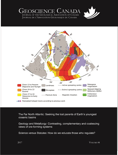
GEOSCIENCE CANADA
Scope & Guideline
Elevating Earth Science Discourse Since 1979
Introduction
Aims and Scopes
- Geological History and Formations:
The journal explores the geological history of various regions in Canada, including detailed studies of rock formations and geological events, providing insights into the evolution of the Canadian landscape. - Mineral Resources and Economic Geology:
Research on critical minerals, mining history, and the economic implications of geological resources is a strong focus, addressing the challenges and opportunities within Canada's resource sector. - Geoscience Education and Outreach:
There is a notable emphasis on educational initiatives and outreach programs aimed at increasing public engagement and understanding of geoscience, including tools for educators and community involvement. - Environmental and Conservation Geosciences:
The journal highlights the intersection of geoscience with environmental issues and conservation efforts, showcasing studies that support sustainable practices and the protection of geological heritage. - Interdisciplinary Approaches:
Research often employs interdisciplinary methodologies, incorporating aspects of paleontology, archaeology, and cultural heritage, reflecting the diverse applications of geoscience in understanding human history and Earth's processes.
Trending and Emerging
- Critical Minerals and Resource Management:
The emphasis on critical minerals has surged, highlighting the importance of understanding mineral resources in the context of technological advancements and environmental sustainability, particularly in battery and renewable energy sectors. - Geoscience and Climate Change:
Research addressing the implications of climate change and the role of geoscience in mitigation and adaptation strategies is increasingly prominent, reflecting the urgent need for scientific input in environmental policy. - Indigenous Knowledge and Conservation Efforts:
There is a growing trend towards incorporating Indigenous knowledge and perspectives in geoscience research, particularly in conservation initiatives, acknowledging the vital role of local communities in environmental stewardship. - Educational Innovation in Geoscience:
Innovative approaches to geoscience education, including the development of online tools and outreach programs, are emerging as key themes, promoting accessibility and engagement in the geosciences. - Interdisciplinary Research Collaborations:
The journal showcases an increasing number of interdisciplinary studies that combine geoscience with other fields, such as archaeology and environmental science, reflecting a holistic approach to understanding complex geological and societal issues.
Declining or Waning
- Historical Geological Studies:
There appears to be a reduction in papers focused solely on historical geological studies that do not have clear contemporary implications, as the journal shifts towards more applied and interdisciplinary topics. - Traditional Volcanology:
Research specifically dedicated to traditional volcanology has decreased, possibly due to the growing interest in other aspects of geology that integrate environmental and societal concerns. - Localized Geological Surveys:
Papers focusing exclusively on localized geological surveys with minimal broader relevance have become less frequent, as the journal aims to present research with wider implications for Canadian geoscience.
Similar Journals
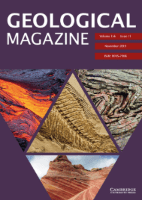
GEOLOGICAL MAGAZINE
A Legacy of Excellence in Geological ScholarshipGEOLOGICAL MAGAZINE, published by Cambridge University Press, is a premier journal in the field of geology, renowned for its rich legacy since 1864 and ongoing contributions to Earth and Planetary Sciences. With an impressive Q1 ranking in Geology and a Scopus rank of #70 out of 321 journals, it holds a significant position within the academic community, appealing to researchers, professionals, and students alike. The journal covers a wide array of topics, ensuring a comprehensive platform for the dissemination of cutting-edge geological research. Although it does not offer open access, it remains a vital resource for those seeking to stay abreast of advancements in the field. With an enduring commitment to quality, GEOLOGICAL MAGAZINE stands as an essential outlet for scholarly communication and serves as a catalyst for academic discourse within the geological sciences.

GEOLOGIA CROATICA
Connecting Researchers to the Heart of GeologyGEOLOGIA CROATICA is a distinguished open-access journal published by the Croatian Geological Survey, dedicated to advancing the field of Earth and planetary sciences. Since its inception in 1992, this peer-reviewed journal has become an essential resource for researchers, professionals, and students interested in various aspects of geology. With its robust impact factor and a prestigious place in Scopus rankings, ranking 127th out of 321 in Geology and 77th out of 159 in miscellaneous Earth and Planetary Sciences as of 2023, GEOLOGIA CROATICA maintains a strong international presence. It provides a platform for the dissemination of critical research findings, promoting collaboration and knowledge sharing among the global scientific community. By focusing on high-quality manuscripts that cover geological processes, hazards, and resources, this journal is pivotal for anyone looking to contribute to or expand their understanding of geological sciences. The journal's commitment to open access ensures that invaluable research is accessible to all, fostering a more informed and scientifically engaged society.
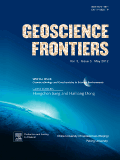
Geoscience Frontiers
Leading the Charge in Earth Science DiscoveriesGeoscience Frontiers is a premier open-access journal that has been at the forefront of disseminating impactful research in the field of Earth and Planetary Sciences since its inception in 2010. Published by China University of Geosciences, Beijing, this journal operates from the Netherlands and has gained recognition for its rigorous peer-review process and high standards of scholarship, earning a distinguished position as Q1 in the Earth and Planetary Sciences category. With a Scopus ranking of 5 out of 195, placing it in the 97th percentile, it reflects the journal's commitment to addressing global geological challenges and advancing our understanding of the Earth’s dynamic systems. As an open-access platform, Geoscience Frontiers ensures that vital research is widely accessible, fostering collaboration and innovation among researchers, professionals, and students alike. By providing a forum for cutting-edge discoveries and theories, the journal plays a critical role in shaping the future of geoscientific research and education.

Economic and Environmental Geology
Fostering Discussions for Sustainable Geological PracticesEconomic and Environmental Geology is a peer-reviewed journal published by the Korea Society for Economic & Environmental Geology, focusing on critical intersections within the fields of economic geology and environmental science. With an ISSN of 1225-7281 and an E-ISSN of 2288-7962, this journal serves as a vital platform for researchers, professionals, and students engaged in the comprehensive study of geological resources and their impacts on the environment. As of 2023, the journal is categorized in the Q4 quartile for both Economic Geology and Environmental Science, indicating its emergent impact in these domains. Despite being in the early stages of its convergence from 2017 to 2024, the journal holds importance for advancing knowledge and fostering discussions about sustainable geological practices in South Korea and beyond. The journal does not currently offer open-access options, but it continues to provide essential insights into the challenges and innovations within economic and environmental geology.
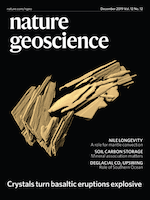
Nature Geoscience
Innovating Solutions for a Sustainable Earth.Nature Geoscience, a premier journal published by NATURE PORTFOLIO, provides a platform for the dissemination of high-quality research in Earth and Planetary Sciences. With an impressive impact factor reflecting its significance — ranking in the 99th percentile and positioned at #1 out of 195 in Scopus Ranks within its category, this journal is a leading authority in its field. Since its inception in 2008, it has fostered interdisciplinary collaboration, addressing critical challenges such as climate change, natural disasters, and resource management. Although it does not offer Open Access, the journal is accessible through various research libraries, ensuring that vital findings reach a broad audience. The journal's esteemed reputation in the Q1 quartile of Earth and Planetary Sciences makes it an essential resource for researchers, professionals, and students aiming to advance their understanding of geoscientific phenomena.
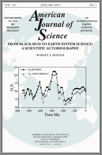
AMERICAN JOURNAL OF SCIENCE
Shaping the Future of Planetary ResearchThe American Journal of Science, published by the esteemed Amer Journal Science, stands as a leading platform for groundbreaking research in the field of Earth and Planetary Sciences. With an impressive impact factor and distinguished Scopus rank 34/195 in its category, the journal occupies a prestigious position in the academic community, reflecting its high-quality and influential contributions to scientific knowledge. The journal’s objective is to disseminate original research, comprehensive reviews, and critical discussions that advance our understanding of geological processes and planetary phenomena, supporting scholars and practitioners in their pursuit of knowledge. Despite its traditional publication structure, viewers can explore its rich repository of works dating from 1945 to present, offering a wealth of insights into the dynamic Earth sciences. The journal remains a vital resource for researchers, professionals, and students eager to engage with the latest scientific findings and foster further innovation in the field.

Journal of Himalayan Earth Sciences
Connecting Research and Innovation in Earth SciencesThe Journal of Himalayan Earth Sciences (ISSN: 1994-3237; E-ISSN: 2305-6959) is a distinguished publication by UNIV PESHAWAR, dedicated to advancing knowledge in the field of earth sciences, particularly as they relate to the Himalayan region. Established in 2013, this journal aims to provide a platform for researchers, professionals, and students to share original research findings, reviews, and innovative methodologies that contribute to the understanding of geological and environmental phenomena in this ecologically significant area. Despite being categorized in Q4 of the Earth and Planetary Sciences, the journal showcases valuable contributions to the scientific community and encourages submissions that delve into both the challenges and advancements within Earth sciences, with a particular focus on the unique geological structures and processes of the Himalayas. As an open-access journal, it ensures that research is accessible to a global readership, promoting collaboration and discussion among scholars and practitioners. The journal's operational base in Peshawar, Pakistan, places it at the heart of Himalayan research, making it an invaluable resource for those invested in earth sciences.

DOKLADY EARTH SCIENCES
Exploring the Frontiers of Geoscience ResearchDOKLADY EARTH SCIENCES is a reputable journal published by MAIK NAUKA/INTERPERIODICA/SPRINGER, focusing on the dynamic field of Earth and Planetary Sciences. With an ISSN of 1028-334X and E-ISSN 1531-8354, this journal offers a platform for researchers to disseminate their findings and insights that contribute to our understanding of Earth systems over a continuous publishing span from 1998 to 2024. It currently holds a Q3 quartile ranking in the Earth and Planetary Sciences category, reflecting an emerging yet significant impact within its field, evidenced by its Scopus ranks where it stands at 123rd in general Earth sciences and 113th in miscellaneous Earth sciences. DOKLADY EARTH SCIENCES aims to bridge research gaps and foster collaboration among a diverse audience including researchers, professionals, and students committed to advancing knowledge in geoscience. The journal stands as a vital resource for those seeking to explore contemporary challenges and innovations within the realm of Earth sciences.

Boletin de Ciencias de la Tierra
Catalyzing Environmental Awareness through Scholarly WorkBoletin de Ciencias de la Tierra is a distinguished open-access journal dedicated to the field of Earth and Planetary Sciences, published by the Universidad Nacional de Colombia, Sede Medellín. Since its transition to open access in 2006, it has become an essential platform for disseminating high-quality research that addresses critical geological and environmental issues pertinent to Latin America and beyond. With an ISSN of 0120-3630 and an E-ISSN of 2357-3740, the journal aims to promote scientific dialogue and share innovative findings in various areas including geology, geochemistry, and environmental sciences. Although it currently holds a Scopus rank of #184 in the General Earth and Planetary Sciences category, indicating a percentile of only 5, Boletin de Ciencias de la Tierra is committed to fostering a rich academic discourse and enhancing the visibility of scholarly works. Situated in Medellín, Colombia, the journal serves as a vital resource for researchers, professionals, and students looking to explore advancements and participate in the global conversation on Earth sciences.
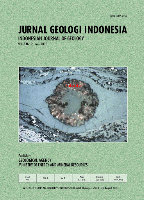
Indonesian Journal of Geoscience
Connecting Minds to Unravel Earth's Complexities.Indonesian Journal of Geoscience, published by the GEOLOGICAL AGENCY, is a vital platform for sharing cutting-edge research in the field of Earth and Planetary Sciences. With an ISSN of 2355-9314 and E-ISSN of 2355-9306, this open-access journal has been making significant contributions to the geoscientific community since its establishment in 2013. Operating out of Bandung, Indonesia, the journal is dedicated to disseminating high-quality research across diverse areas, making it an essential resource for researchers, professionals, and students alike. Recognized in the 2023 Q2 category in Earth and Planetary Sciences, it currently ranks #134/195 among general Earth and Planetary Sciences journals in Scopus, reflecting its growing prominence and academic rigor. The journal seeks to foster scientific discussions by publishing original research, reviews, and case studies that address contemporary challenges and advancements in geoscience, thus contributing to a deeper understanding of our planet. With its commitment to open access, the Indonesian Journal of Geoscience ensures that vital research is accessible to a global audience, encouraging collaboration and innovation in the field.